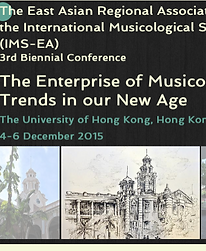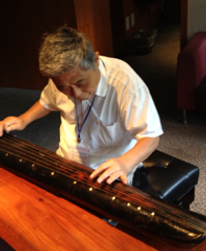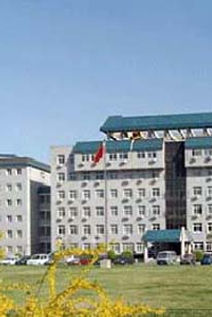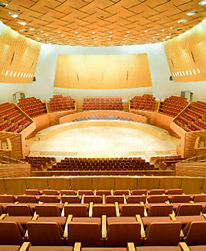CHIME Newsletter No. 19
16 October 2015
Newslettter of CHIME, European Foundation for Chinese Music Research

Where is Chinese music heading?
Raucous shawms, wistful love songs,
bold avant-garde sounds...
Experience it all at the 19th CHIME Geneva
21-25 October 2015
The abundant programme for our upcoming event is available for your scrutiny here.
The range of concerts and other events almost causes some embarrasment on our part... International film premieres, concerts by prominent instrumentalists, a nanyin workshop that will get you acqainted with exquisite Chinese southern love ballads, 66 individual papers and a good deal more. There's no way around it – we had to schedule parallel sessions (and quite a few of them) to make it all fit. Regrettably, the Shanghai Sinfonietta cancelled their cooperation just days ago, due to visa problems. Highly unfortunate at such a late stage (we agreed on this cooperation more than one year ago, and could have re-directed a considerable part of our own budget if we had known this earlier), but our program is no less rich for this, and still full of surprises.
A few days to go now for Chime Geneva, and we're all set...!
Calls for papers & conferences

Storysinging / storytelling in China – call for extra papers
The planned volume of the CHIME journal on Chinese storytelling and storysinging is shaping up nicely. We urge everyone who did not respond yet to our recent call for submissions to send us their papers. Given the importance of the material at hand so far, we are considering an edition that will be available electronically as well as in print. We are happy to invite extra papers on such topics as local and regional storysinging genres, xiangsheng (cabaret in dialogue form), biographical sketches of storysingers and -tellers in China, ritual forms of the Chinese narrative arts, and any other topic related to the main theme. Articles should not exceed 8,000 words in length, and should reach us within the next two months! Tables, illustrations and music samples should be sent as separate files, not as part of the main text document. For further editorial guidelines, please check the Chime website. You can send contributions to (or get in touch for more information with) the Editor of CHIME, Frank Kouwenhoven, at chime@wxs.nl
The bulk of this volume will be based on papers presented during last year's CHIME workshop in Venice. A marvellous occasion, that many of us will remember fondly. For a lovely video impression of some of the performances which we hosted during that meeting, you can check here.
There's also a separate video of Dai Xiaolian's qin performance during the Venice meeting.
Eventually, the plan is to publish full-length videos of all the performances which we recorded in Venice on the internet, with English subtitling, via the websites of CHIME and of Fondazione Cini. We will keep you posted.

10th Conference on Interdisciplinary Musicology
Shanghai, 27-29 November 2015
The Tenth Conference on Interdisciplinary Musicology will be the first of its kind to be held in Asia. The conference will be hosted by the Shanghai Conservatory of Music, from 27 to 29 November, 2015. The theme of this conference is “imagination in music”, which covers a variety of disciplines, such as sound science, sound technology, physiology, psychology, sociology, aesthetics, philosophy, historical science, ethnology, anthropology and the science of concept (ideology). The organizers write: 'in music research, the role of imagination in music has been undervalued and ignored. If we are to understand composition, performance, cognition, acceptance and the significance and social function of music, we must understand at the same time how music is produced through imagination. This conference will be held in both Chinese and English. Chinese participants will speak with English translation, aided by slides presented in English. All handouts will be bilingual with Chinese and English. For more information, please visit this website.

IMS East Asia meeting on new trends in Musicology
Hong Kong, 4-6 December 2015
Musical and musicological trends are ever changing with evolving sociological, economic, and political climates; at the same time, trends can also be geographic-specific. The East Asian Regional Association of the International Musicological Society (IMS-EA) 2015 will hold a conference in Hong Kong from 4-6 December 2015 which deals with this topic, under the title The Enterprise of Musicology: Trends in our New Age. IMS East Asia 2015 will set out to examine current trends of musicological thoughts, and in particular, 'Asian trends' – if such a phenomenon could be discerned. Asian countries are some of the fastest growing in the world: in technology, in science, in cultural development, and in educational innovation. Are such elements influential factors in musicological trends in Asia and world-wide? The deadline for submitting paper proposals has passed.
For more on the conference, check http://www.imsea2015.org

JSS Call for Papers: Soundscapes of South-East Asia
South-East Asia is filled with sounds; indeed, some people would say that it is a noisy part of the world. However, is it possible to identify a specific South-East Asian soundscape? And if so, where are the roots to be found, and how did these sounds achieve their current form?
The Journal of Sonic Studies is searching for scholarly and artistic contributions that deal with the relation between South-East Asian history, culture, society, and politics and the production, distribution, and reception of sounds, noises, and silence. The broader aim of this special issue is to establish “sound” as an analytical category that provides us with challenging perspectives on and a new understanding of South-East Asia. Therefore it does not focus on any particular historical period or research methodology, but seeks to bring scholars and artist-researchers together who share an interest in South-East Asian soundscapes.
Potential contributors are invited to submit completed essays by January 6, 2016.
For more information, or to submit an essay, please contact noise@sonicstudies.org

Call for Papers: Fourth Performance Studies Network International Conference
Bath Spa University, Bath, UK, 14–17 July 2016
The international Performance Studies Network comprises professional and amateur musicians, scholars working in a range of musicological disciplines (including music history, analysis, psychology, pedagogy, ethnomusicology and composition), and colleagues from the creative industries. The fourth international conference of the Performance Studies Network will be held at Bath Spa University, Newton Park campus, from 14 to 17 July 2016.
The aim is to debate theories, methodologies and practices of performance, and to engage with increasingly diverse, interdisciplinary developments in the field in order to encourage a more global perspective on performance studies.
Deadline for proposals: Friday 30 October 2015. For more information, you can contact Amanda Bayley at psn2016@bathspa.ac.uk or visit the conference website at www.psn2016.org
Concerts

Three days of music for plucked lutes
Bozar, Brussels, November 2015
Mid-November, Bozar in Brussels offers a minifestival of plucked lutes. On 12 November, Chinese pipa player Wu Man, well-known from her cooperation with the Kronos Quartet and in Yo-Yo Ma's Silk Road Project, joins forces with the Uyghur singer Sanubar Tursun. On 13 November, Iranian tar and setar player Hossein Alizadeh introduces his new project Meynoush, an ode to wine, poetry and bliss, and he will also bring a shrangiz, a self-made instrument. He will be joined by Alireza Ghorbani and Ensemble Zarbang. Finally, on 14 November, the Belgian sextet Luthomania offers a synthesis. The group plays the Chinese pipa in conjunction with Arab ud, western lute and theorbe. For this concert, the group will be reinforced by Trio Cuerdas, wioth baroque harp, guzheng and qanun. All concerts start at 20.00 PM. More information: www.bozar.be
Music Research, Publications

Major survey of storysinging and -telling in China
Quyi yinyue gailun 曲艺音乐概论 ('Introduction to Chinese professional storysinging'), was written by Yu Huiyong and published by the Central Conservatory of Music Press (Zhongyang yinyuexueyuan chubanshe) in 2012. The book is based on a manuscript by Yu Huiyong (1925-1977) which he completed in 1957. It was initially intended as a textbook for graduates of the Music Theory Department of the Shanghai Conservatory. The content, which is of considerable academic interest, is mostly based on the author's own fieldwork experiences and interviews. In the first part of the book, the author outlines his definition of folk art narrative forms (quyi 曲艺), and discusses a classification of the many different regional genres.

An oral history of qin (zither) players in Sichuan
Shuzhong qinren koushu shi 蜀中琴人口述史 ('An oral history of qin players in central Sichuan') is an anthology of interviews and data compiled by musicologist Yang Xiao (杨晓) and published by the Joint Publishing Co, (Xinzhi sanlian shudian 新知三联书店) in Chengdu, 2013. It is the first oral history book of its kind devoted to a group of Chinese traditional qin players, well-written and of major significance, since human documents of this kind are still relatively rare in the realm of Chinese musicology. The book consists of two parts, the first one an oral record of twenty players' reminiscenses from Sichuan province, the second one a set of memorial writings by five players. The book traces the history of qin playing in Sichuan ('Shu' in literary language) from the late Qing dynasty onwards, and throughout the political and social upheavals of the twentieth century. In-between the lines of the personal stories we can read much about the transformation of Chinese culture from a rural or classical culture to a modern society, and what pains and efforts it took on the part of the musicians. Naturally we also learn a great deal about qin music as a shared spiritual homeland and potential refuge for many of these performers.
People In Music

In memoriam Cheng Gongliang (1940-2015)
Cheng Gongliang, one of the 'grand old men' of guqin (seven string zither) playing in China, died in mid-July after a protracted illness. He will be remembered as a truly fine musician, a master of deceleration and acceleration, with breathtaking playing techniques and a rich poetic vein, and also as a very kind, gentle and modest personality and inspriring music teacher. Cheng Gongliang remained active giving concerts until 2014.

In memoriam Jack Body (1944-2015)
New Zealand composer Jack Body died after a long battle with cancer on 10 May this year at the Mary Potter hospice in his hometown Wellington. He was 70. The news did not come as a surprise, people knew that Jack was very ill. But all the same it was extremely unsettling news, because Jack Body was such a marvellous man, an artist of many gifts and a tireless music and art organizer, but also a wonderful friend and colleague, a man of exceptional warmth.
Music News: Events, Venues, Artists

Unique event: a seminar for music critics at the Central Conservatory
Throughout July 2015, the Central Conservatory in Beijing hosted an educational seminar for music critics in China. It was the first event of this kind ever to take place in China. Chinese and foreign music experts (composers, performers, researchers, and writers on music) met for a series of talks, workshops and concerts, with the aim of reflecting on a field that is widely recognized to be weak or even almost non-existent in China: that of music criticism. For this fact alone, it must be marked as an event of tremendous importance. The seminar was initiated by project leader Jia Guoping, composer and leader of the Conservatory's Research Institute for Contemporary Music. It was very well organized, and well-attended.

New concert hall and facelift for the Shanghai Symphony Orchestra
The Shanghai Symphony Orchestra, under the baton of conductor Yu Long (not to be confused with the Shanghai Philharmonic conducted by Tang Muhai), opened its 2014-15 season on 6 September 2014 in a brand-new 1,200-seat symphony hall, designed by Isozaki Arata and Yasushisa Toyota.
This venue is extraordinary not only for its wave-shaped roofs, but also for its elegant interior, with long bright corridors (mostly underground), interactive displays and multiple lush garden atriums. The internal centerpieces of the complex are two music halls: one an orchestral stadium seating 1200 in vineyard style, with clusters of terraced seating which allow the entire audience to be close to the orchestra, and an additional 400-seat chamber music/recording/rehearsal hall in 'courtyard style'.

Music Conservatory Websites in China
(and an impressive site on Chinese instruments)
China currently has eleven music conservatories. Two of these are located in Beijing (The Central and the China Conservatories), the other institutions are in Shanghai, Wuhan, Chengdu (Sichuan Conservatory), Tianjin, Xi'an, Guanzhou (Xinghai Conservatory), and Shenyang. The conservatories in Harbin and in Hangzhou (Zhejiang Conservatory) are recent additions which started out as music academies and acquired 'conservatory' status. Apart from the conservatories, there are hundreds of music academies, urban art institutes and universities with extended music departments in China. For the conservatories, we list the official websites here, and some information on what they offer.
Composition competition for Chinese Chamber Operas
In order to promote the development of Chinese opera and provide young composers with an opportunity to gain practical experience, the China Central Conservatory of Music has initiated the “Programme of Promotion for the Composition of Chinese Chamber Operas”.
Undergraduate students, graduate students and teachers in the Composition Department of the Central Conservatory of Music are invited to submit new chamber operas (with two to four actors) sung in Chinese. There is no limitation to the subject matter and style, which can be either ancient or modern, Chinese or foreign. The accompanying ensemble should be small: four to eight instrumentalists. The duration of each opera should be fifteen to twenty minutes. The deadline for submission is 2 November, 2015.
Artistic director of the project is the composer Guo Wenjing.
A small number of selected works will be premiered in a simple staging in the Central Conservatory's auditorium on 14 December, 2015

Stars from China lining up in western classical music
We may be mistaken, but 28-year old pianist Wang Yuja appears to be surpassing Lang Lang's superstatus as China's finest classical pianist of the moment. Her touring schedule and partners are constantly impressive, the extatic reviews in the international press even more so, with the Los Angeles Times recently observing (after a concert she gave at the Hollywood Bowl) that 'her nonchalant, brilliant keyboard virtuosity would have made both Prokofiev and even the fabled Horowitz jealous.'
CHIME Newsletter No. 19, October 2015
News compiled by Frank Kouwenhoven, Liu Hongchi, Zhang Mingming and Bi Yifei
